Module 4 Seeing the doctor知识点讲解课件41张2021-2022学年外研版八年级英语下册
文档属性
| 名称 | Module 4 Seeing the doctor知识点讲解课件41张2021-2022学年外研版八年级英语下册 | 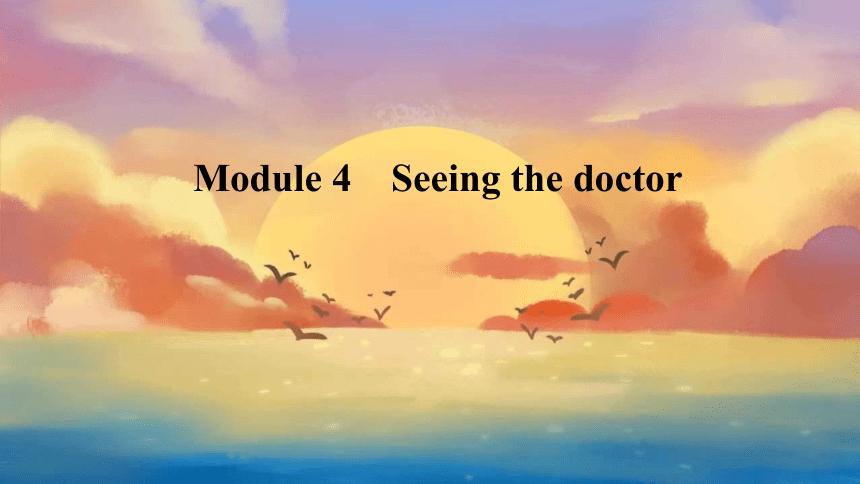 | |
| 格式 | pptx | ||
| 文件大小 | 327.8KB | ||
| 资源类型 | 教案 | ||
| 版本资源 | 外研版 | ||
| 科目 | 英语 | ||
| 更新时间 | 2022-04-17 12:16:58 | ||
图片预览


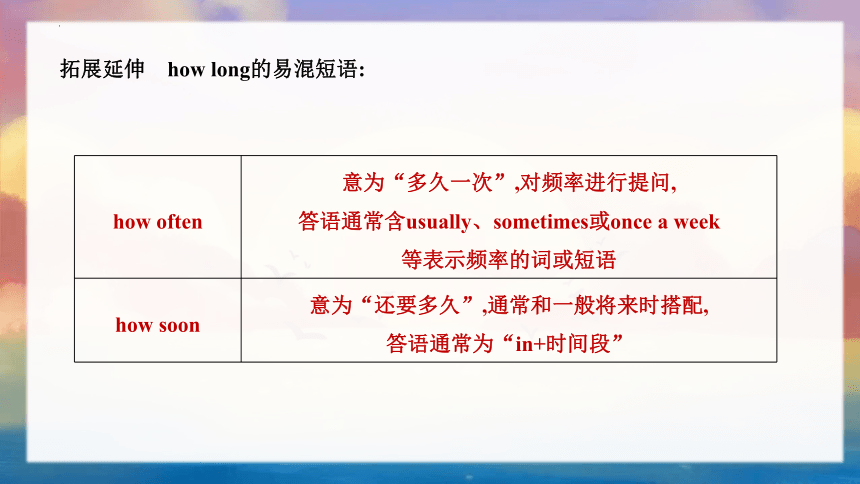
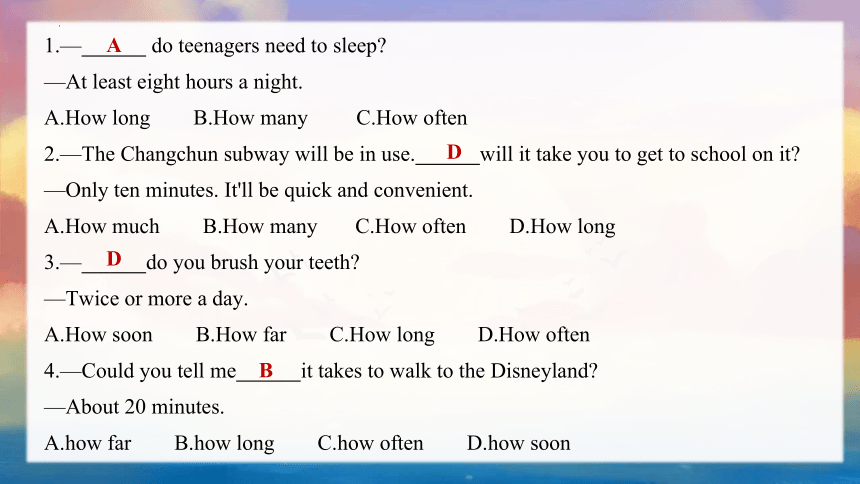

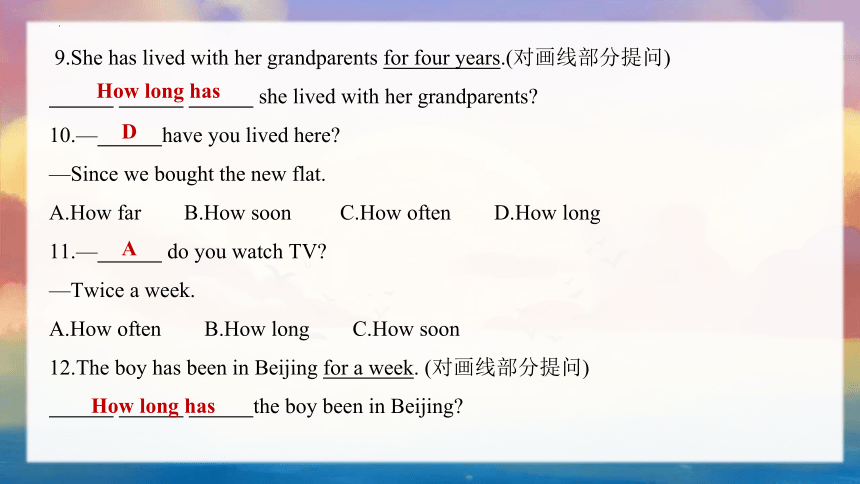
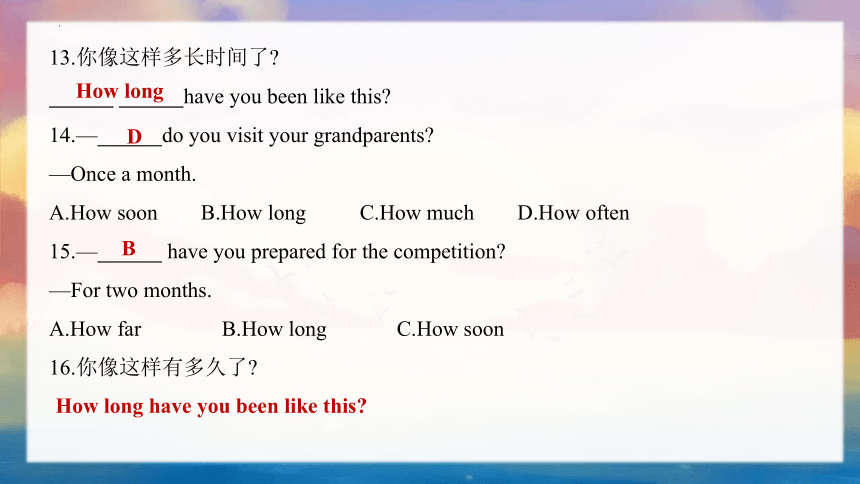
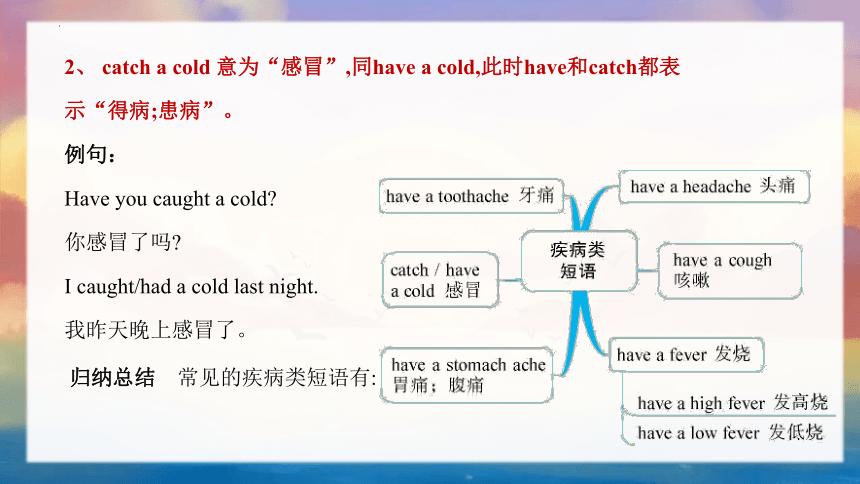

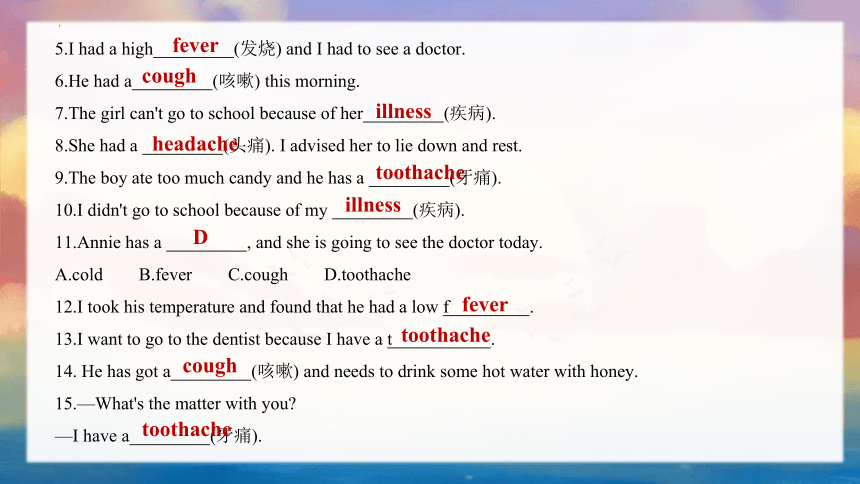
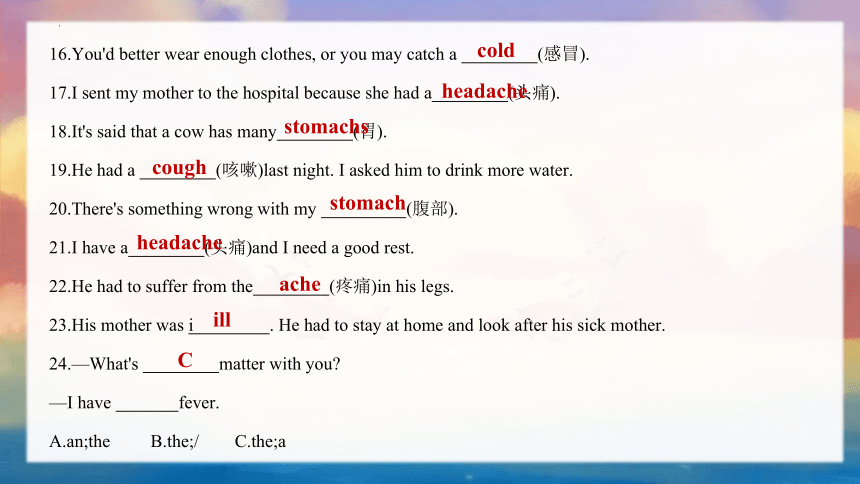
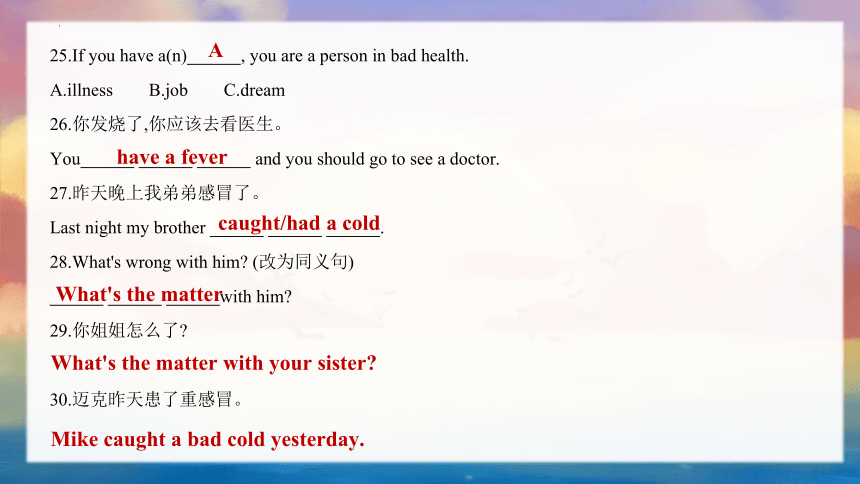
文档简介
(共41张PPT)
Module 4 Seeing the doctor
1、how long引导的特殊疑问句
例句:How long have you been like this 你像这样多长时间了
本句是how long引导的特殊疑问句,how long意为“多长时间”,用来对时间段进行提问,常见的答语有“for+时间段”以及由since构成的短语。
例如:
—How long have you been away from your hometown 你离开家乡多久了
—For about five years.大约五年了。
拓展延伸 how long的易混短语:
how often 意为“多久一次”,对频率进行提问,
答语通常含usually、sometimes或once a week
等表示频率的词或短语
how soon 意为“还要多久”,通常和一般将来时搭配,
答语通常为“in+时间段”
1.— do teenagers need to sleep
—At least eight hours a night.
A.How long B.How many C.How often
2.—The Changchun subway will be in use. will it take you to get to school on it
—Only ten minutes. It'll be quick and convenient.
A.How much B.How many C.How often D.How long
3.— do you brush your teeth
—Twice or more a day.
A.How soon B.How far C.How long D.How often
4.—Could you tell me it takes to walk to the Disneyland
—About 20 minutes.
A.how far B.how long C.how often D.how soon
A
D
D
B
5.—I wonder the students have a physical examination.
—Once a year.
A.how far B.how soon C.how long D.how often
6.— have you studied in No. 1 Middle School
—For two years.
A.How far B.How long C.How much D.How often
7.— have you ever stayed in Australia with your family
—For five years.
A.How far B.How soon C.How long D.How often
8.— have you kept this book
—For two weeks.
A.How many B.How much C.How long D.How often
D
B
C
C
9.She has lived with her grandparents for four years.(对画线部分提问)
she lived with her grandparents
10.— have you lived here
—Since we bought the new flat.
A.How far B.How soon C.How often D.How long
11.— do you watch TV
—Twice a week.
A.How often B.How long C.How soon
12.The boy has been in Beijing for a week. (对画线部分提问)
the boy been in Beijing
D
A
How long has
How long has
13.你像这样多长时间了
have you been like this
14.— do you visit your grandparents
—Once a month.
A.How soon B.How long C.How much D.How often
15.— have you prepared for the competition
—For two months.
A.How far B.How long C.How soon
16.你像这样有多久了
How long
D
B
How long have you been like this
2、 catch a cold 意为“感冒”,同have a cold,此时have和catch都表
示“得病;患病”。
例句:
Have you caught a cold
你感冒了吗
I caught/had a cold last night.
我昨天晚上感冒了。
归纳总结 常见的疾病类短语有:
1.Nancy took her temperature and found she had a .
A.cough B.toothache C.cold D.fever
2.—Mom, I .
—I'm sorry to hear that, dear. We must go to see the dentist right away.
A.have a headache B.have a stomach ache C.have a toothache
3.—What's matter with you
—I have toothache.
A.a;the B.the;/ C./;a D.the;a
4.昨天晚上我忘记带外套,所以我感冒了。
I forgot to take my coat with me last night, so I .
D
C
D
caught/had a cold
5.I had a high (发烧) and I had to see a doctor.
6.He had a (咳嗽) this morning.
7.The girl can't go to school because of her (疾病).
8.She had a (头痛). I advised her to lie down and rest.
9.The boy ate too much candy and he has a (牙痛).
10.I didn't go to school because of my (疾病).
11.Annie has a , and she is going to see the doctor today.
A.cold B.fever C.cough D.toothache
12.I took his temperature and found that he had a low f .
13.I want to go to the dentist because I have a t .
14. He has got a (咳嗽) and needs to drink some hot water with honey.
15.—What's the matter with you
—I have a (牙痛).
fever
cough
illness
headache
toothache
illness
D
fever
toothache
cough
toothache
16.You'd better wear enough clothes, or you may catch a (感冒).
17.I sent my mother to the hospital because she had a (头痛).
18.It's said that a cow has many (胃).
19.He had a (咳嗽)last night. I asked him to drink more water.
20.There's something wrong with my (腹部).
21.I have a (头痛)and I need a good rest.
22.He had to suffer from the (疼痛)in his legs.
23.His mother was i . He had to stay at home and look after his sick mother.
24.—What's matter with you
—I have fever.
A.an;the B.the;/ C.the;a
cold
headache
stomachs
cough
stomach
headache
ache
ill
C
25.If you have a(n) , you are a person in bad health.
A.illness B.job C.dream
26.你发烧了,你应该去看医生。
You and you should go to see a doctor.
27.昨天晚上我弟弟感冒了。
Last night my brother .
28.What's wrong with him (改为同义句)
with him
29.你姐姐怎么了
30.迈克昨天患了重感冒。
A
have a fever
caught/had a cold
What's the matter
What's the matter with your sister
Mike caught a bad cold yesterday.
31.He didn't attend the meeting because of his (疾病).
32.What's wrong with you
What's with you
33.What's wrong with Lisa (改为同义句)
What's with Lisa
34.两天来我一直头痛得厉害。
35.上周我牙痛,牙医建议我把那颗牙拔掉。
36.The boy was badly ill. He had to drop out of school because of .
A.illness B.history
C.excitement D.darkness
illness
the matter
the matter
I have had a terrible headache for the last two days.
Last week I had a toothache and the dentist advised me to pull out the tooth.
A
3、since引导的时间状语从句
例句:I haven't done much exercise since I got my computer last year.
自从我去年有了电脑,就没怎么锻炼过。
本句是含时间状语从句的主从复合句,since I got my computer last year是
since引导的时间状语从句,since作连词,意为“自从;自……以来”。since
引导的时间状语从句通常用一般过去时,主句通常用现在完成时。
例如:She has worked for CCTV since she graduated from the university.
她从大学毕业以来就为中央电视台工作。
易错提醒 since还可以作介词,意为“自从;自……以来”,作介词时后跟表示时间的词或短语。
例如:
We have lived in Hong Kong since two years ago.
我们从两年前就开始住在香港。
拓展延伸 since作连词时还有“因为;由于”之意,此时用来引导原因状
语从句,但它的语气没有because强烈。
例如:Since we don't have enough money, we can't buy a new car.
因为我们没有足够的钱,所以我们不能买新汽车。
1.I ate some fruit, which I since I was a child, and the vegetables from my garden.
A.have enjoyed B.enjoyed C.enjoy D.had enjoyed
2.—It has been much easier for me to go to work shared bikes appeared.
—But they also caused plenty of problems.
A.since B.before C.unless D.though
3.She's been working in the bank s she left school.
4. 2000, this company has seen much new development.It has become one of the biggest
companies in the country.
A.For B.In C.By D.Since
5.Bob and Jim have been good friends (自从)they joined the same tennis team.
A
A
D
since
since
4、 take sb.'s temperature 意为“量某人的体温”,
其中take是动词,意为“测定;量取”;temperature作名词,意为“体温;温度”。
例句:
Let me take your temperature...
让我来量量你的体温……
She took my temperature and told me that I had a fever.
她量了量我的体温,告诉我我发烧了。
1.Lily's mother has taken her to see if she has a fever.
A.address B.temperature C.message D.order B
2.别忘了先量一下你的体温。
Don't forget to first.
3.I took my t and knew I had a high fever.
4.那个护士帮我量了体温。
5.她已经量了体温,体温不高。
She has her and it's not high.
6.—It's so hot that I don't want to go out. What's the t today
—It's about 38℃.
7.我想借一支体温计量量我的体温。
B
take your temperature
temperature
The nurse helped me(to) take my temperature.
taken temperature
temperature
I want to borrow a thermometer to take my temperature.
5、 be harmful to 对……有害=be bad for
harmful作形容词,意为“有害的”,它是由harm加形容词后缀构成的。
例句:
It can be very harmful to your health.
它会对你的健康有很大害处。
Smoking and drinking are harmful to your health.
抽烟和喝酒对你的健康有害。
1.Eating junk food does harm to your health.(改为同义句)
Eating junk food your health.
2.Junk food is bad for our health.(改为同义句)
Junk food is our health.
3.—If you want to stay healthy, you must give up smoking.
—Sure, I will. Smoking is my health.
A.good for B.harmful to C.full of D.used to
4.PM2.5 does harm to people's health and the environment.(同义句)
PM2.5 is people's health and the environment.
is bad for/is harmful to
harmful to
B
bad for/harmful to
5.Be careful to choose. Some food can be very harmful your health.
A.of B.to C.in D.for B
6.吃太多垃圾食品对你的健康有害。
Eating too much junk food is harmful to your health.
7.你在电脑前坐的时间太长,这对你的健康不好。
You spend too much time in front of the computer.
.
8.污染了的水和空气对人的健康有害。
The polluted water and air are harmful to people's health.
B
It's harmful to/bad for your health
6、 health 名词,意为“健康(状况)”,是不可数名词。
例句:
It can be very harmful to your health.
它会对你的健康有很大害处。
We're worrying about their health.
我们担心他们的健康状况。
拓展延伸 短语:in good health 身体健康
in poor/bad health身体不好
派生词:healthy adj. 健康的 unhealthy adj. 不健康的
1. He is seldom ill, so he is in good h .
2.Eating too much fast food is bad for your h .
3.Don't eat too much junk food. It's not good for your h .
4.Junk food tastes delicious, but it isn't h . So we should keep away from it.
health
health
health
healthy
7、active 形容词,意为“活跃的;积极的”。
例句:
I have never been very active, and I do not like sports.
我一直以来都不怎么活跃,也不喜欢运动。
He is very old, but he is still active.
他年纪很大了,但仍然很活跃。
拓展延伸 派生词:actively adv. 活跃地;积极地
短语:take an active part in... 积极参加……
1.Tony is very and he enjoys doing all kinds of exercise after school.
A.lonely B.nervous C.active D.awful
2.—How are you getting on with your cousin
—Very well. He is really and joins in all kinds of activities in his spare time.
A.polite B.strict C.active D.careful
3.I often take an (积极的) part in some outdoor activities.
4.My friend Sally is really . She likes to take part in different activities after school.
A.quiet B.kind C.active D.clever
5.His daughter is very (活跃的)at school.
C
C
C
active
active
8、sleepy 形容词,意为“困倦的;想睡的”。
例句:
When I got to work, I always felt very sleepy and I was not happy.
工作时,我总是觉得很困,也不开心。
I didn't sleep well last night, so I felt sleepy this morning.
我昨天晚上没有睡好,所以今天早上觉得困。
拓展延伸 同根词:sleep v. & n. 睡觉
asleep adj. 睡着的
1.I didn't sleep well last night. Now I feel so s .
2.In spring, many students feel (困倦的)in class.
3.If you don't go to bed early, you may feel s next day.
4.I felt very (困的)and I was not happy.
sleepy
sleepy
sleepy
sleepy
9、too...to...句式结构表示“太……而不能……”,
其中too后跟形容词或副词,to后跟动词原形。
例句:
Perhaps I am too weak to do any exercise.
可能我太虚弱了,做不了任何运动。
含有too...to...的句子可以和含有so...that...的句子进行同义转换。
例如:She was too tired to walk.
=She was so tired that she couldn't walk.
她太累了,走不动了。
1.The train travelled fast for us to see much outside the window.
A.quite B.very C.too D.so
2.我弟弟年龄太小,不能上学。
My brother is young go to school.
3.Dogs are difficult take care of.
A.to;too B.so;that C.such;that D.too;to
4.Linda is so young. She can't take a taxi on her own.(合并为一句)
Linda is to take a taxi on her own.
C
too to
D
too young
5.She is poor afford the expensive suit.
A.so;that B.enough;to C.too;to
6.—Would you like to go shopping with me
—I'm afraid I'm tired go.
A.so;that B.too;to C.very;that D.enough;to
7.The box is so heavy that I can't carry it.
The box is heavy for me carry.
8.房间里太黑了,我不敢进去。
The room is too inside.
C
B
too to
dark for me to go/walk
10、现在完成时(3)
本模块的语法知识还是现在完成时,不过本模块侧重讲for、since以及非延
续性动词在现在完成时中的应用。
(1)for、since在现在完成时中的应用
for后要跟时间段
since后要跟表示时间点的词、短语或时间状语从句
这几种形式都是现在完成时的标志。
He has been away for two years.他已经离开两年了。
He has been an English teacher since last year.自去年以来他一直是一名英语教师。
拓展延伸 “since+时间点”和“for+时间段”都是现在完成时的标志。
两者还可以进行同义转换。
例如:
They have lived in China since two years ago.
=They have lived in China for two years.
他们在中国已经住了两年了。
(2)非延续性动词与延续性动词之间的转化
英语中的动词从动作延续性上可以分为延续性和非延续性两种。在现在
完成时中一定要注意动词的这一特性,在和表示一段时间的状语连用时,应
将非延续性动词转换为延续性动词。
I have had the book for two weeks.
那本书我买了两个星期了。
My grandfather has been dead for two years.
我爷爷去世两年了。
归纳总结 常见的需要转换的动词有:
非延续性动词 延续性动词
leave be away (from)
begin be on
buy have
borrow keep
join be in
die be dead
become be
1.—Your new watch is so nice! When did you buy it
—In April. I it for two months.
A.have had B.had C.have bought D.bought
2.Our school life a lot since 2017. We have more activities now.
A.changes B.changed C.will change D.has changed
3.Lily is my classmate. We each other since she came to our school.
A.know B.knew C.have known D.will know
4.—How long have you China
—For three years.
A.left B.returned C.been away from D.come back
5.Betty started to learn Chinese in 2010.(改为现在完成时)
Betty Chinese 2010.
A
D
C
C
has learned since
6.I have already taken my temperature. (改为一般疑问句)
your temperature
7.They have worked for the company for three years. (改为同义句)
They have worked for the company three years .
8.—How long have you been collecting coins
— .
A.Three years ago
B.For three years
C.Since three years
D.For three years ago
Have you taken yet
since ago
B
9.My friend many postcards since he went to Paris.
A.sent B.sends C.will send D.has sent
10.I in the city since I left school.
A.live B.will live C.was living D.have lived
11.They have learned English for five years.(改为同义句)
They have learned English five years .
12.那个男孩从来没有去过北京。
The boy to Beijing.
13.他借那本杂志多久了
How has he the magazine
14.我妹妹已经病了三天了。
My sister for three days.
D
D
since ago
has never been
long kept
has been ill/sick
15.His uncle moved to Canada in 2011.
He there for eight years.
A.is living B.was living C.lives D.has lived
16.Steve in our school since he came to Beijing.
A.works B.worked C.has worked D.will work
17.My father in a panda protection center for 10 years, so he knows a lot about pandas.
A.was working B.is working C.has worked D.will work
18.It's nice to see you again. We each other since 2014.
A.won't see B.don't see C.haven't seen D.didn't see
19.从那时起,他就一直住在那个公寓里。
He has lived in the flat .
20.The old man died two years ago.
The old man two years.
D
C
C
C
since then
has been dead for
11、辨析join、take part in与attend
三者都有“参加”的意思,但用法不同。
join 指加入某个党派、团体、组织等,成为其成员之一;还可以表示加入某个人群
take part in 指参加会议或群众性活动等,着重说明句子主语参加该项活动
并在活动中发挥作用
attend 是正式用语,通常指参加会议、婚礼、葬礼、典礼等,
还可以表示上课、上学、听报告等
When did your brother join the army
你哥哥什么时候参军的
Would you like to join us
你想加入我们吗
We'll take part in social practice during the summer vacation.
暑假期间我们将参加社会实践。
He'll attend an important meeting tomorrow.
他明天要参加一个重要的会议。
拓展延伸 join in是固定搭配,意为“参加”,多指参加某项活动或讨论等。
I'm going to join in more outdoor activities.
我打算参加更多户外活动。
1.—We are going to organize a concert to raise money for poor children. Do you want to us
—Sure. I want to do something for them.
A.join B.take part in C.attend D.join in
2.老师鼓励我们多参加户外活动。
The teacher encouraged us to more outdoor activities.
3.你应该积极参加户外运动。
You should outdoor activities.
4.你会参加下周的运动会吗
Will you next week's sports meeting
5.My brother likes sports very much. He always all kinds of outdoor activities.
A.joins B.takes part in C.Attends
6.参加这项运动不需要太多体力
Taking part in this sport doesn't need too much strength.
A
take part in
take an active part in
take part in
B
Module 4 Seeing the doctor
1、how long引导的特殊疑问句
例句:How long have you been like this 你像这样多长时间了
本句是how long引导的特殊疑问句,how long意为“多长时间”,用来对时间段进行提问,常见的答语有“for+时间段”以及由since构成的短语。
例如:
—How long have you been away from your hometown 你离开家乡多久了
—For about five years.大约五年了。
拓展延伸 how long的易混短语:
how often 意为“多久一次”,对频率进行提问,
答语通常含usually、sometimes或once a week
等表示频率的词或短语
how soon 意为“还要多久”,通常和一般将来时搭配,
答语通常为“in+时间段”
1.— do teenagers need to sleep
—At least eight hours a night.
A.How long B.How many C.How often
2.—The Changchun subway will be in use. will it take you to get to school on it
—Only ten minutes. It'll be quick and convenient.
A.How much B.How many C.How often D.How long
3.— do you brush your teeth
—Twice or more a day.
A.How soon B.How far C.How long D.How often
4.—Could you tell me it takes to walk to the Disneyland
—About 20 minutes.
A.how far B.how long C.how often D.how soon
A
D
D
B
5.—I wonder the students have a physical examination.
—Once a year.
A.how far B.how soon C.how long D.how often
6.— have you studied in No. 1 Middle School
—For two years.
A.How far B.How long C.How much D.How often
7.— have you ever stayed in Australia with your family
—For five years.
A.How far B.How soon C.How long D.How often
8.— have you kept this book
—For two weeks.
A.How many B.How much C.How long D.How often
D
B
C
C
9.She has lived with her grandparents for four years.(对画线部分提问)
she lived with her grandparents
10.— have you lived here
—Since we bought the new flat.
A.How far B.How soon C.How often D.How long
11.— do you watch TV
—Twice a week.
A.How often B.How long C.How soon
12.The boy has been in Beijing for a week. (对画线部分提问)
the boy been in Beijing
D
A
How long has
How long has
13.你像这样多长时间了
have you been like this
14.— do you visit your grandparents
—Once a month.
A.How soon B.How long C.How much D.How often
15.— have you prepared for the competition
—For two months.
A.How far B.How long C.How soon
16.你像这样有多久了
How long
D
B
How long have you been like this
2、 catch a cold 意为“感冒”,同have a cold,此时have和catch都表
示“得病;患病”。
例句:
Have you caught a cold
你感冒了吗
I caught/had a cold last night.
我昨天晚上感冒了。
归纳总结 常见的疾病类短语有:
1.Nancy took her temperature and found she had a .
A.cough B.toothache C.cold D.fever
2.—Mom, I .
—I'm sorry to hear that, dear. We must go to see the dentist right away.
A.have a headache B.have a stomach ache C.have a toothache
3.—What's matter with you
—I have toothache.
A.a;the B.the;/ C./;a D.the;a
4.昨天晚上我忘记带外套,所以我感冒了。
I forgot to take my coat with me last night, so I .
D
C
D
caught/had a cold
5.I had a high (发烧) and I had to see a doctor.
6.He had a (咳嗽) this morning.
7.The girl can't go to school because of her (疾病).
8.She had a (头痛). I advised her to lie down and rest.
9.The boy ate too much candy and he has a (牙痛).
10.I didn't go to school because of my (疾病).
11.Annie has a , and she is going to see the doctor today.
A.cold B.fever C.cough D.toothache
12.I took his temperature and found that he had a low f .
13.I want to go to the dentist because I have a t .
14. He has got a (咳嗽) and needs to drink some hot water with honey.
15.—What's the matter with you
—I have a (牙痛).
fever
cough
illness
headache
toothache
illness
D
fever
toothache
cough
toothache
16.You'd better wear enough clothes, or you may catch a (感冒).
17.I sent my mother to the hospital because she had a (头痛).
18.It's said that a cow has many (胃).
19.He had a (咳嗽)last night. I asked him to drink more water.
20.There's something wrong with my (腹部).
21.I have a (头痛)and I need a good rest.
22.He had to suffer from the (疼痛)in his legs.
23.His mother was i . He had to stay at home and look after his sick mother.
24.—What's matter with you
—I have fever.
A.an;the B.the;/ C.the;a
cold
headache
stomachs
cough
stomach
headache
ache
ill
C
25.If you have a(n) , you are a person in bad health.
A.illness B.job C.dream
26.你发烧了,你应该去看医生。
You and you should go to see a doctor.
27.昨天晚上我弟弟感冒了。
Last night my brother .
28.What's wrong with him (改为同义句)
with him
29.你姐姐怎么了
30.迈克昨天患了重感冒。
A
have a fever
caught/had a cold
What's the matter
What's the matter with your sister
Mike caught a bad cold yesterday.
31.He didn't attend the meeting because of his (疾病).
32.What's wrong with you
What's with you
33.What's wrong with Lisa (改为同义句)
What's with Lisa
34.两天来我一直头痛得厉害。
35.上周我牙痛,牙医建议我把那颗牙拔掉。
36.The boy was badly ill. He had to drop out of school because of .
A.illness B.history
C.excitement D.darkness
illness
the matter
the matter
I have had a terrible headache for the last two days.
Last week I had a toothache and the dentist advised me to pull out the tooth.
A
3、since引导的时间状语从句
例句:I haven't done much exercise since I got my computer last year.
自从我去年有了电脑,就没怎么锻炼过。
本句是含时间状语从句的主从复合句,since I got my computer last year是
since引导的时间状语从句,since作连词,意为“自从;自……以来”。since
引导的时间状语从句通常用一般过去时,主句通常用现在完成时。
例如:She has worked for CCTV since she graduated from the university.
她从大学毕业以来就为中央电视台工作。
易错提醒 since还可以作介词,意为“自从;自……以来”,作介词时后跟表示时间的词或短语。
例如:
We have lived in Hong Kong since two years ago.
我们从两年前就开始住在香港。
拓展延伸 since作连词时还有“因为;由于”之意,此时用来引导原因状
语从句,但它的语气没有because强烈。
例如:Since we don't have enough money, we can't buy a new car.
因为我们没有足够的钱,所以我们不能买新汽车。
1.I ate some fruit, which I since I was a child, and the vegetables from my garden.
A.have enjoyed B.enjoyed C.enjoy D.had enjoyed
2.—It has been much easier for me to go to work shared bikes appeared.
—But they also caused plenty of problems.
A.since B.before C.unless D.though
3.She's been working in the bank s she left school.
4. 2000, this company has seen much new development.It has become one of the biggest
companies in the country.
A.For B.In C.By D.Since
5.Bob and Jim have been good friends (自从)they joined the same tennis team.
A
A
D
since
since
4、 take sb.'s temperature 意为“量某人的体温”,
其中take是动词,意为“测定;量取”;temperature作名词,意为“体温;温度”。
例句:
Let me take your temperature...
让我来量量你的体温……
She took my temperature and told me that I had a fever.
她量了量我的体温,告诉我我发烧了。
1.Lily's mother has taken her to see if she has a fever.
A.address B.temperature C.message D.order B
2.别忘了先量一下你的体温。
Don't forget to first.
3.I took my t and knew I had a high fever.
4.那个护士帮我量了体温。
5.她已经量了体温,体温不高。
She has her and it's not high.
6.—It's so hot that I don't want to go out. What's the t today
—It's about 38℃.
7.我想借一支体温计量量我的体温。
B
take your temperature
temperature
The nurse helped me(to) take my temperature.
taken temperature
temperature
I want to borrow a thermometer to take my temperature.
5、 be harmful to 对……有害=be bad for
harmful作形容词,意为“有害的”,它是由harm加形容词后缀构成的。
例句:
It can be very harmful to your health.
它会对你的健康有很大害处。
Smoking and drinking are harmful to your health.
抽烟和喝酒对你的健康有害。
1.Eating junk food does harm to your health.(改为同义句)
Eating junk food your health.
2.Junk food is bad for our health.(改为同义句)
Junk food is our health.
3.—If you want to stay healthy, you must give up smoking.
—Sure, I will. Smoking is my health.
A.good for B.harmful to C.full of D.used to
4.PM2.5 does harm to people's health and the environment.(同义句)
PM2.5 is people's health and the environment.
is bad for/is harmful to
harmful to
B
bad for/harmful to
5.Be careful to choose. Some food can be very harmful your health.
A.of B.to C.in D.for B
6.吃太多垃圾食品对你的健康有害。
Eating too much junk food is harmful to your health.
7.你在电脑前坐的时间太长,这对你的健康不好。
You spend too much time in front of the computer.
.
8.污染了的水和空气对人的健康有害。
The polluted water and air are harmful to people's health.
B
It's harmful to/bad for your health
6、 health 名词,意为“健康(状况)”,是不可数名词。
例句:
It can be very harmful to your health.
它会对你的健康有很大害处。
We're worrying about their health.
我们担心他们的健康状况。
拓展延伸 短语:in good health 身体健康
in poor/bad health身体不好
派生词:healthy adj. 健康的 unhealthy adj. 不健康的
1. He is seldom ill, so he is in good h .
2.Eating too much fast food is bad for your h .
3.Don't eat too much junk food. It's not good for your h .
4.Junk food tastes delicious, but it isn't h . So we should keep away from it.
health
health
health
healthy
7、active 形容词,意为“活跃的;积极的”。
例句:
I have never been very active, and I do not like sports.
我一直以来都不怎么活跃,也不喜欢运动。
He is very old, but he is still active.
他年纪很大了,但仍然很活跃。
拓展延伸 派生词:actively adv. 活跃地;积极地
短语:take an active part in... 积极参加……
1.Tony is very and he enjoys doing all kinds of exercise after school.
A.lonely B.nervous C.active D.awful
2.—How are you getting on with your cousin
—Very well. He is really and joins in all kinds of activities in his spare time.
A.polite B.strict C.active D.careful
3.I often take an (积极的) part in some outdoor activities.
4.My friend Sally is really . She likes to take part in different activities after school.
A.quiet B.kind C.active D.clever
5.His daughter is very (活跃的)at school.
C
C
C
active
active
8、sleepy 形容词,意为“困倦的;想睡的”。
例句:
When I got to work, I always felt very sleepy and I was not happy.
工作时,我总是觉得很困,也不开心。
I didn't sleep well last night, so I felt sleepy this morning.
我昨天晚上没有睡好,所以今天早上觉得困。
拓展延伸 同根词:sleep v. & n. 睡觉
asleep adj. 睡着的
1.I didn't sleep well last night. Now I feel so s .
2.In spring, many students feel (困倦的)in class.
3.If you don't go to bed early, you may feel s next day.
4.I felt very (困的)and I was not happy.
sleepy
sleepy
sleepy
sleepy
9、too...to...句式结构表示“太……而不能……”,
其中too后跟形容词或副词,to后跟动词原形。
例句:
Perhaps I am too weak to do any exercise.
可能我太虚弱了,做不了任何运动。
含有too...to...的句子可以和含有so...that...的句子进行同义转换。
例如:She was too tired to walk.
=She was so tired that she couldn't walk.
她太累了,走不动了。
1.The train travelled fast for us to see much outside the window.
A.quite B.very C.too D.so
2.我弟弟年龄太小,不能上学。
My brother is young go to school.
3.Dogs are difficult take care of.
A.to;too B.so;that C.such;that D.too;to
4.Linda is so young. She can't take a taxi on her own.(合并为一句)
Linda is to take a taxi on her own.
C
too to
D
too young
5.She is poor afford the expensive suit.
A.so;that B.enough;to C.too;to
6.—Would you like to go shopping with me
—I'm afraid I'm tired go.
A.so;that B.too;to C.very;that D.enough;to
7.The box is so heavy that I can't carry it.
The box is heavy for me carry.
8.房间里太黑了,我不敢进去。
The room is too inside.
C
B
too to
dark for me to go/walk
10、现在完成时(3)
本模块的语法知识还是现在完成时,不过本模块侧重讲for、since以及非延
续性动词在现在完成时中的应用。
(1)for、since在现在完成时中的应用
for后要跟时间段
since后要跟表示时间点的词、短语或时间状语从句
这几种形式都是现在完成时的标志。
He has been away for two years.他已经离开两年了。
He has been an English teacher since last year.自去年以来他一直是一名英语教师。
拓展延伸 “since+时间点”和“for+时间段”都是现在完成时的标志。
两者还可以进行同义转换。
例如:
They have lived in China since two years ago.
=They have lived in China for two years.
他们在中国已经住了两年了。
(2)非延续性动词与延续性动词之间的转化
英语中的动词从动作延续性上可以分为延续性和非延续性两种。在现在
完成时中一定要注意动词的这一特性,在和表示一段时间的状语连用时,应
将非延续性动词转换为延续性动词。
I have had the book for two weeks.
那本书我买了两个星期了。
My grandfather has been dead for two years.
我爷爷去世两年了。
归纳总结 常见的需要转换的动词有:
非延续性动词 延续性动词
leave be away (from)
begin be on
buy have
borrow keep
join be in
die be dead
become be
1.—Your new watch is so nice! When did you buy it
—In April. I it for two months.
A.have had B.had C.have bought D.bought
2.Our school life a lot since 2017. We have more activities now.
A.changes B.changed C.will change D.has changed
3.Lily is my classmate. We each other since she came to our school.
A.know B.knew C.have known D.will know
4.—How long have you China
—For three years.
A.left B.returned C.been away from D.come back
5.Betty started to learn Chinese in 2010.(改为现在完成时)
Betty Chinese 2010.
A
D
C
C
has learned since
6.I have already taken my temperature. (改为一般疑问句)
your temperature
7.They have worked for the company for three years. (改为同义句)
They have worked for the company three years .
8.—How long have you been collecting coins
— .
A.Three years ago
B.For three years
C.Since three years
D.For three years ago
Have you taken yet
since ago
B
9.My friend many postcards since he went to Paris.
A.sent B.sends C.will send D.has sent
10.I in the city since I left school.
A.live B.will live C.was living D.have lived
11.They have learned English for five years.(改为同义句)
They have learned English five years .
12.那个男孩从来没有去过北京。
The boy to Beijing.
13.他借那本杂志多久了
How has he the magazine
14.我妹妹已经病了三天了。
My sister for three days.
D
D
since ago
has never been
long kept
has been ill/sick
15.His uncle moved to Canada in 2011.
He there for eight years.
A.is living B.was living C.lives D.has lived
16.Steve in our school since he came to Beijing.
A.works B.worked C.has worked D.will work
17.My father in a panda protection center for 10 years, so he knows a lot about pandas.
A.was working B.is working C.has worked D.will work
18.It's nice to see you again. We each other since 2014.
A.won't see B.don't see C.haven't seen D.didn't see
19.从那时起,他就一直住在那个公寓里。
He has lived in the flat .
20.The old man died two years ago.
The old man two years.
D
C
C
C
since then
has been dead for
11、辨析join、take part in与attend
三者都有“参加”的意思,但用法不同。
join 指加入某个党派、团体、组织等,成为其成员之一;还可以表示加入某个人群
take part in 指参加会议或群众性活动等,着重说明句子主语参加该项活动
并在活动中发挥作用
attend 是正式用语,通常指参加会议、婚礼、葬礼、典礼等,
还可以表示上课、上学、听报告等
When did your brother join the army
你哥哥什么时候参军的
Would you like to join us
你想加入我们吗
We'll take part in social practice during the summer vacation.
暑假期间我们将参加社会实践。
He'll attend an important meeting tomorrow.
他明天要参加一个重要的会议。
拓展延伸 join in是固定搭配,意为“参加”,多指参加某项活动或讨论等。
I'm going to join in more outdoor activities.
我打算参加更多户外活动。
1.—We are going to organize a concert to raise money for poor children. Do you want to us
—Sure. I want to do something for them.
A.join B.take part in C.attend D.join in
2.老师鼓励我们多参加户外活动。
The teacher encouraged us to more outdoor activities.
3.你应该积极参加户外运动。
You should outdoor activities.
4.你会参加下周的运动会吗
Will you next week's sports meeting
5.My brother likes sports very much. He always all kinds of outdoor activities.
A.joins B.takes part in C.Attends
6.参加这项运动不需要太多体力
Taking part in this sport doesn't need too much strength.
A
take part in
take an active part in
take part in
B
同课章节目录
- Module 1 Feelings and impressions
- Unit 1 It smells delicious.
- Unit 2 I feel nervous when I speak Chinese .
- Unit 3 Language in use
- Module 2 Experiences
- Unit 1 I've also entered lots of speaking competi
- Unit 2 They have seen the Pyramids.
- Unit 3 Language in use
- Module 3 Journey to space
- Unit 1 Has it arrived yet?
- Unit 2 We have not found life on any other planet
- Unit 3 Language in use
- Module 4 Seeing the docto
- Unit 1 I haven't done much exercise since I got m
- Unit 2 We have played football for a year now
- Unit 3 Language in use
- Module 5 Cartoons
- Unit 1 It's time to watch a cartoon.
- Unit 2 Tintin has been popular for over eighty yea
- Unit 3 Language in use
- Revision module A
- Module 6 Hobbies
- Unit 1 Do you collect anything ?
- Unit 2 Hobbies can make you grow as a person.
- Unit 3 Language in use
- Module 7 Summer in Los Angeles
- Unit 1 Please write to me and send me some photos
- Unit 2 Fill out a form and come to learn English
- Unit 3 Language in use
- Module 8 Time off
- Unit 1 I can hardly believe we are in the city ce
- Unit 2 We thought somebody was moving about
- Unit 3 Language in use
- Module 9 Friendship
- Unit 1 Could I ask if you've mentioned this to he
- Unit 2 I believe that the world is what you think
- Unit 3 Language in use
- Module 10 On the radio
- Unit 1 I hope that you can join us one day
- Unit 2 It seemed that they were speaking to me in
- Unit 3 Language in use
- Revision module B
